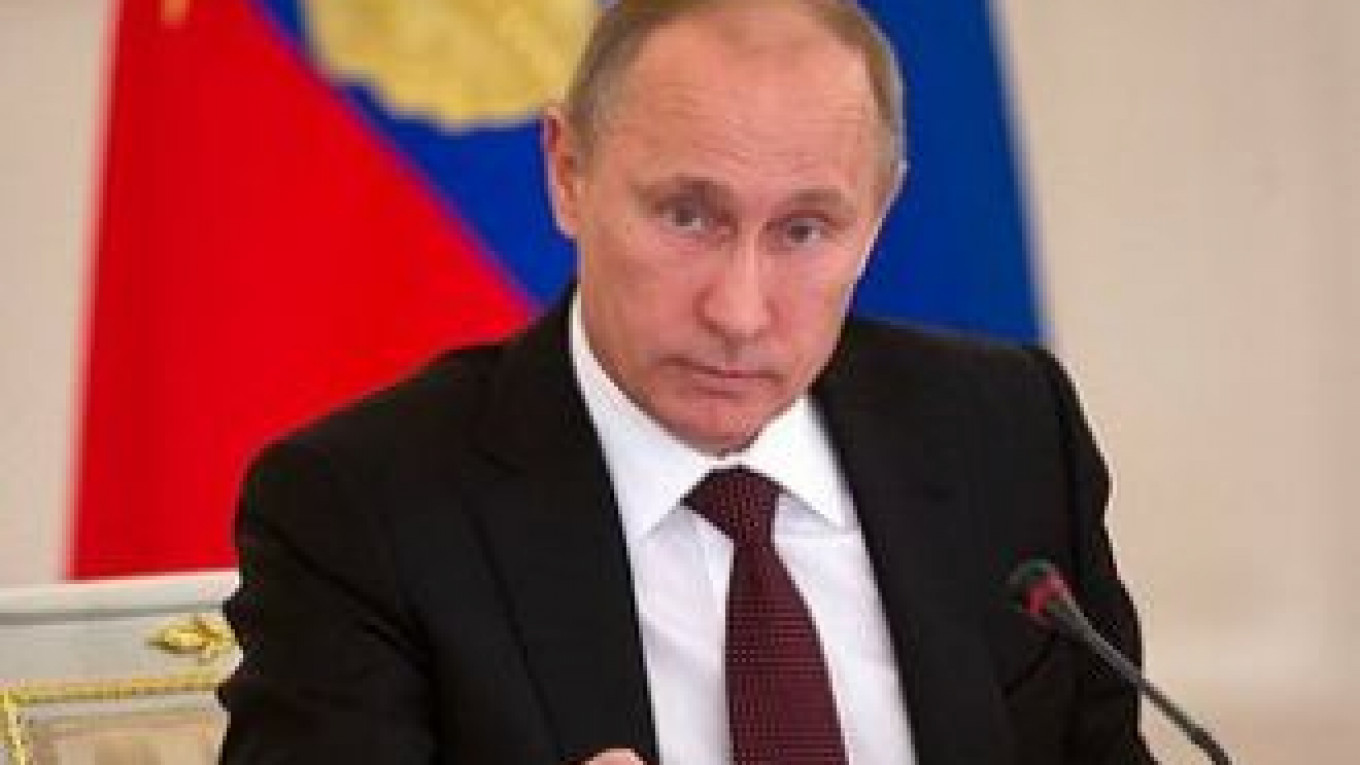President Vladimir Putin on Tuesday submitted a bill to the State Duma that seeks to ban government officials from holding overseas bank accounts or owning foreign-issued bonds and shares.
The legislation, part of a raft of measures proposed by the president that ostensibly target corruption and foreign influence in Russia, appeared to be a softened version of a bill passed in a first reading by the Duma last year stipulating fines or jail time for officials who do not give up certain foreign assets.
Putin’s bill would apply to federal and regional officials, senior prosecutors, board members at the Central Bank and employees at state corporations, according to a copy of the legislation published on the Duma’s official website.
Diplomats and other officials serving abroad would be entitled to keep overseas assets, but officials’ spouses and children, in whose names accounts and assets are often registered to bypass declaration rules, would be included in the ban.
According to the text of the bill, officials must close their foreign accounts and sell any foreign assets within three months of the legislation coming into force. Officials who fail to comply would be fired.
Pro-Kremlin lawmakers backed the move Tuesday as a cornerstone of the government’s anti-corruption strategy, while others linked the bill with efforts to shield Russia from foreign interference.
“Putin is gradually realizing his stated aim of tackling corruption, achieving the deoffshoreization of the economy, instilling responsible behavior in the national elite and preventing dishonest lobbying,” said Irina Yarovaya, head of the State Duma’s Security and Anti-Corruption Committee.
“Deoffshoreization” is a term Putin coined during his December state-of-the-nation address, during which he called for a drive to repatriate Russian capital channeled to offshore jurisdictions.
In comments published on the website of the ruling United Russia party, Yarovaya said the bill defended Russia’s national interests and represented “a real mechanism for cleansing the ranks of officialdom.”
But Olga Mefodyeva, an analyst at the Center for Political Technologies, described the bill as a populist measure intended to appease Russian voters.
“Putin wants to show society that he is trying to discipline Russian officials, who are known to hold their money abroad and buy foreign property,” she said by phone.
Putin’s decision to restrict officials’ foreign holdings comes after the State Duma passed in a first reading in late December a similar bill that envisages fines of up to 10 million rubles ($333,000) and jail terms of up to five years for state employees who don’t relinquish their foreign bank accounts, property or shares.
That bill, which was drafted by lawmakers from all four Duma factions and allows officials to have financial assets abroad only to pay for education or medical treatment, is being amended ahead of a crucial second reading.
Hours after Putin’s bill was announced, Duma Vice Speaker Sergei Zheleznyak said that the earlier bill would be tweaked to correspond with the president’s wishes and that officials would be allowed to own overseas property if it was properly declared.
He said Putin’s bill would not replace the earlier legislation but be passed together with it as a package. It was not immediately clear how the two bills would be reconciled, but analysts said Putin’s bill would sail through the State Duma since it had the president’s approval.
“It will be passed without any question. Putin is taking the political initiative,” said Ivan Ninenko, deputy director of anti-corruption watchdog Transparency International’s Russia office.
But Ninenko said the bill was in no way linked with the government’s anti-corruption strategy and was aimed at protecting Russian officials from a new wave of legislation similar to the U.S. Magnitsky Act.
That law can impose asset freezes and visa bans on Russian human rights violators, including officials implicated in the death of lawyer Sergei Magnitsky in a Moscow jail in 2009. Magnitsky had accused Russian officials of a $230 million tax fraud.
“There is a real threat that European countries will adopt their own Magnitsky Acts, but if Russia bans its officials from holding foreign bank accounts, these laws won’t present any problem,” Ninenko said.
Contact the author at a.winning@imedia.ru
Related articles:
A Message from The Moscow Times:
Dear readers,
We are facing unprecedented challenges. Russia's Prosecutor General's Office has designated The Moscow Times as an "undesirable" organization, criminalizing our work and putting our staff at risk of prosecution. This follows our earlier unjust labeling as a "foreign agent."
These actions are direct attempts to silence independent journalism in Russia. The authorities claim our work "discredits the decisions of the Russian leadership." We see things differently: we strive to provide accurate, unbiased reporting on Russia.
We, the journalists of The Moscow Times, refuse to be silenced. But to continue our work, we need your help.
Your support, no matter how small, makes a world of difference. If you can, please support us monthly starting from just $2. It's quick to set up, and every contribution makes a significant impact.
By supporting The Moscow Times, you're defending open, independent journalism in the face of repression. Thank you for standing with us.
Remind me later.






